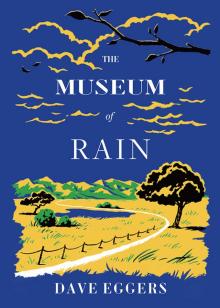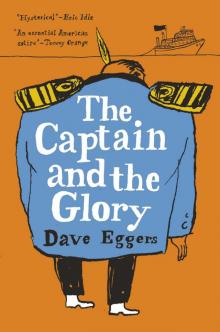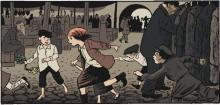- Home
- Dave Eggers
The Captain and the Glory
The Captain and the Glory Read online
Also by Dave Eggers
FICTION
The Parade
Heroes of the Frontier
Your Fathers, Where Are They? And the Prophets, Do They Live Forever?
The Circle
A Hologram for the King
What Is the What
How We Are Hungry
You Shall Know Our Velocity!
MEMOIR
A Heartbreaking Work of Staggering Genius
NONFICTION
The Monk of Mokha
Understanding the Sky
Zeitoun
AS EDITOR
Surviving Justice: America’s Wrongfully Convicted and Exonerated (with Dr. Lola Vollen)
The Voice of Witness Reader: Ten Years of Amplifying Unheard Voices
FOR YOUNG READERS
The Wild Things
This Bridge Will Not Be Gray
Her Right Foot
Tomorrow Most Likely
Most of the Better Natural Things in the World
The Lifters
THIS IS A BORZOI BOOK PUBLISHED BY ALFRED A. KNOPF AND ALFRED A. KNOPF CANADA
Copyright © 2019 by Dave Eggers
All rights reserved. Published in the United States by Alfred A. Knopf, a division of Penguin Random House LLC, New York, and in Canada by Alfred A. Knopf Canada, a division of Penguin Random House Canada Limited, Toronto.
www.aaknopf.com
www.penguinrandomhouse.ca
Knopf, Borzoi Books, and the colophon are registered trademarks of Penguin Random House LLC. Knopf Canada and colophon are trademarks of Penguin Random House Canada Limited.
Library of Congress Control Number: 2019948303
ISBN 9780525659082 (hardcover)
Ebook ISBN 9780525659099
This is a work of fiction. Names, characters, places, and incidents either are the product of the author’s imagination or are used fictitiously. Any resemblance to nefarious public officials responsible for the suffering of countless innocents is entirely metaphorical.
Cover design and illustration by Nathaniel Russell
Illustrations by Nathaniel Russell
v5.4
ep
Contents
Cover
Also by Dave Eggers
Title Page
Copyright
Chapter I
Chapter II
Chapter III
Chapter IV
Chapter V
Chapter VI
Chapter VII
Chapter VIII
Chapter IX
Chapter X
Chapter XI
Chapter XII
Chapter XIII
Chapter XIV
Chapter XV
Chapter XVI
Chapter XVII
Chapter XVIII
Acknowledgments
A Note About the Author
I
THE AGING CAPTAIN, gray at the temples now, had steered the great ship Glory for many years, and was ready to retire. On a bright fall day of white clouds and melancholy, the ship’s passengers, thousands of them, gathered to see him off. They were docked at a lush tropical isle, where the departing captain planned to retire, to eat the freshest fruit and drink from the purest springs. He had been a kind and unflappable skipper for many years, through seas turbulent and tranquil, and watching him descend the gangplank brought more than a few of the Glory’s passengers to tears.
Among the citizens of the ship there were carpenters and teachers, painters and professors and plumbers, and they had come to the ship from the planet’s every corner. They did not always agree on everything, but they shared a history, and over centuries together they had faced death and birth, glorious sunrises and nights of unease, war and sorrow and triumph and tragedy. Through it all they had developed a sense that they were a mad, ragged quilt of humanity, full of color and contradiction, but unwilling to be separated or torn.
With the old captain leaving, the passengers talked about who should succeed him. It was a daunting task. The departing captain was both war hero and learned man, was indeed so accomplished a sailor and diplomat that he had earned the nickname the Admiral—an honorific never given to another captain before him.
There were a number of possible replacements for the Admiral—a dozen or so crew members who had steered great ships before, who knew nautical navigation and maritime law. There were at least ten, in fact, who had worked on this particular ship for decades and knew its every last gauge and gudgeon. As the passengers were contemplating which of these qualified persons could take the helm, one of the passengers spoke up.
“I’ll do it,” he said loudly with a voice at once high-pitched and hoarse. This man was large and lumpy, and a bit hunched over, and wore a yellow feather in his hair. All the passengers knew him well. They knew him to be the guy who sold cheap souvenirs near the putt-putt golf course, who had borrowed money from all of the ship’s adults and some of its teenagers, who swindled rubes via three-card monte and pig-in-the-poke, who stayed inside on windy or rainy days (because the effect on his feather was catastrophic) and who said pretty much anything that popped into his head.
“I like that guy,” said one passenger. “He says anything that pops into his head.”
“Yeah!” yelled another. This man’s nickname was Fingers, because he regularly stole passengers’ wallets and purses, and specialized in stealing candy from children. Fingers was close friends with the man with the yellow feather, and the two of them were part of a coterie of petty thieves and confidence men who typically gathered under the stairs near the women’s locker room so they could take upskirt photos. Among them was Ed the Unwashed, who laundered money, and Sweetie, who resold the candy Fingers had stolen from children. There was a blackmailer named Benny the Squeeze, a murderer named Patsy the Murderer, and a patsy named Michael the Cohen. There was a knee-breaker named Freddie the Whack, and a nattily dressed racketeer named Paul the Manafort, and they both—they all—led the cheers for the man with the yellow feather. They and the rest of the Upskirt Boys—for that was what they called themselves—were greatly amused by the idea of their buddy, whom they all secretly considered almost unbearably vulgar and thin-skinned and having an oniony, old-man smell, becoming captain.
“Let me be captain!” the man with the yellow feather yelled. He had never been a captain before. He had never steered a ship of any kind or size, and had insulted the previous captains loudly and often. In fact, for years this man had been telling his fellow passengers how much he didn’t even like boats. He had said, over and over, that all ships were bad, and everyone running them was bad. In fact, he loathed everyone on the ship, unless they were willing to loan him money or were women-in-bathing-suits.
“Let me be captain!” he said again.
Fingers and Sweetie and Pete the Pipe—forgot to mention Pete the Pipe; he hit people with pipes—laughed, because the idea of their friend becoming captain was demented. It was bonkers. Many other passengers laughed, too, because all the passengers knew the man with the yellow feather to be clownish and not the least bit qualified. He was also known to all as someone who lied so often it was considered involuntary and incurable. When he had $43 in his pocket he said he had $76. When he lost at cards or golf, he walked away, then told the first person he encountered that he’d won. When there was no reason to lie, he lied. He lied about the time of day while standing under a clock. Between that and the f
act that he often joked crudely, everyone assumed that this, too, was a lie or crude joke.
“This time I’m not lying or joking,” he said, and put on a serious face, pouting his lips as serious people do. Then he put his hand on his heart, and sang a patriotic song for as long as he could remember the words.
This patriotism was confusing to those passengers who remembered that when the ship had been at war some years ago, and all the young men and women of the Glory had fought with swords and cannons to protect the ship and its thousands of innocents, the man with the yellow feather had hidden in the bowels of the ship looking through pornographic magazines.
“Let’s hear him out,” said a grandfather of nine who in every way was sensible and true.
The passengers asked the man with the yellow feather how he felt about taxes.
“Only suckers pay them,” he said.
“Hooray!” said many of the passengers. They thought this a novel approach to paying taxes—to not pay them. With that one statement, the candidacy of the man with the yellow feather gained considerable momentum.
“I declare,” said the grandfather of nine who in every way was sensible and true, “that we need someone like this to shake things up.”
The passengers all mulled this idea, and began discussing it in earnest. The idea of shaking things up—anything from one’s toothpaste to one’s shoes—held a certain inherent appeal to most of the ship’s citizens. To them, shaking things up held the promise, however irrational and unproven, that everything shaken, or tossed randomly into the air, might come down better. Somehow, in the flying and falling, steel might become gold, sadness might become triumph, what had been good might become great.
“Shake things up! Shake things up!” This chant was started by a gaggle of teenage boys, who were only half-serious, and who had most recently been seen urinating their names onto the shuffleboard court.
Amid the noise, the ship’s first mate, a courageous woman who had stood by the previous captain’s side for too many years to count, stepped forward.
“My fellow passengers,” she said, “with all due respect, the last thing we need is someone shaking things up. This is a ship. A ship full of humans, all of them in our care. Outside, the ocean is vast and deep and teeming with the unknown—from squalls to sharks to typhoons. The sea provides enough uncertainty and chaos. The last thing we need is a captain providing more of all that.”
But many passengers had become intrigued with the notion of the man with the yellow feather occupying the most important position on the ship. There had long been a maxim on the ship, uttered by every parent to every child, that stated, “On this ship, anyone can grow up to be captain.” It was a dictum that spoke of the ship’s dedication to opportunity and equality and an ostensibly classless society. When this maxim was first expressed, though, its originator meant that from any humble beginning, through decades of rigorous study and apprenticeship, through certifications and examinations, anyone might eventually ascend to the captain’s chair.
But over the years, this notion had come to mean that any imbecile might decide on a certain Monday to become a captain, and by Tuesday, with no qualifications whatsoever, that imbecile could take charge of a 300,000-ton vessel and the thousands of lives contained within.
To underline the point, one thoughtful man stepped forward, a pedagogical index finger in the air. “If we truly believe that anyone can grow up to be captain,” he said, “we should prove it by electing the least qualified, least respected person on the ship—a man who has never done anything for anyone but himself, a man who has palpable disdain for all previous captains, and no respect at all for the builders of the ship, its history, or anything it stands for.”
To many of the passengers, this made a wonderful kind of sense. To prove they were all equal, they should, the logic followed, be led by a known moron.
Amid the discussion, a girl of twelve stepped forward. Her name was Ava. As a child, Ava did not have a say in the voting over who would guide the vessel, but still she spoke up. “I’ve been listening to this debate,” she said, “and I have to say I’m flabbergasted that this idea is even being entertained. There’s no way a rational group of adults would ever give such power to a man like this, over our very lives—a man who has absolutely no relevant experience, who has never sailed even a dinghy—a man known only for a crude mouth and a yellow feather, a man who at this very moment is trying to feel up my mother”—for he was feeling up the girl’s mother just then.
“Give yourselves some credit,” Ava said. “We are a noble people with a storied history. We deserve to be led by the most enlightened, reasonable and honorable among us, not the loudest, cruelest, most selfish and most foul.”
II
“I LIKE BEING CAPTAIN,” said the man with the yellow feather. He was installed high on the bridge of the Glory, and surveyed the seas with swelling pride. The ship’s passengers had elected him to steer the ship and he was very pleased about it.
The supporters of the new Captain were pleased, too. In fact, they were jubilant. Never in their lifetimes had something like this happened. They felt triumphant and unstoppable and capable of anything. To celebrate the unprecedented victory, they planned a parade to honor the new Captain, to be held later that day. While some supporters were festooning the ship with bunting and balloons, a group of the Captain’s most ardent fans—too excited to be effective decorators—instead found a pair of passengers who had supported the previous captain, and they beat them with clubs and hammers, thinking joyfully of the new Captain with every blow. While they beat their opposition, they got word that the Admiral had just died. So shocked and disappointed was he in the ascendance of the Glory’s worst passenger, that his head froze and his heart burst simultaneously, causing the rest of his body to give up, too. This news, though sad for many, was very satisfying to the most fervent supporters of the man with the yellow feather. It made them feel not just triumphant but liberated, too—free from history, free from all that was staid and stuffy and stale.
And yet there was something that nagged at these supporters of the man with the yellow feather. When the little girl had given her speech, in which she called the new Captain, and by inference his supporters, “most foul,” it had stung. In fact it really hurt.
But then a few of the Captain’s most besotted supporters had an idea. And the idea was to own it. In preparation for the parade, they attached to their clothing thousands of chicken feathers and fashioned beaks from paper plates. On their chests they wrote the words MOST FOUL and they strutted around the ship, much to the delight of the Captain’s other supporters. The Upskirt Boys considered them daffy and grotesque, but they said nothing, hoping the feathered nonsense would catch on.
It did. In short order, dozens more supporters created their own Most Foul costumes, some of them using the aviary spelling of the word, each of them choosing to dress as whatever bird reflected their personality. And thus, when the parade began, and the Captain was carried on a litter through the crowds, he saw his supporters costumed as hens and roosters, roadrunners and condors, chickadees and cockatoos. They held signs that read, A CAPTAIN MOST FOUL! and they cheered the new captain with abandon. When the Captain came near, they tried to touch him but he recoiled, because he considered them filthy simpletons who carried unnameable and uncountable contagions and germs.
Otherwise, though, it was a wonderful parade, and the new Captain wished it could have lasted forever. The idea of standing on the bridge, navigating and steering all day, held less appeal than being cheered by people dressed in handmade avian costumes. At the end of the parade, he was carried to the bridge, where he met the eyes of a dozen crew members there to assist him, none of whom he trusted. He looked at all the screens and levers and buttons, and he whistled. “There sure are a lot of screens and buttons here!” He whistled again. “This is already more complicated than I thought,�
�� he thought.
He decided he needed some help. Immediately his mind turned to a woman he’d been seeing around the ship. He’d been watching her for as long as he could remember, admiring her comely heart-shaped face and her glorious figure and her hair, which was silky and straight and as yellow as his feather. He often talked to other men about how attractive she was, and how good she smelled, and how much he’d like to date her. He wanted such a gorgeous creature near him always, so he asked her if she would help him steer the ship.
“Okay, Dad,” she said.
III
WITH HIS DAUGHTER by his side, the Captain felt much better. His daughter had brought her doll, though, and the sight of it, a limp boy-doll with rosy cheeks and black, vacant eyes, always gave him pause. There was something at once vacuous and sinister about the lifeless faux-boy, but his daughter loved that doll, so the Captain had no choice but to accept the two of them as a package. There were other elements around him, though, that the Captain found more irritating.
“Who are all these people around us?” he asked.
“That’s the crew, Dad. They help steer the ship. That’s the chief engineer, and that’s the staff captain, and that’s the—”
“Stop,” the Captain said, “please stop,” his brain already hurting from all the terminology. The Captain felt uneasy around people he had not hired himself, and to make matters worse, many of the crew members on the bridge had mustaches, and the Captain felt uneasy around mustaches. The Captain floated the idea to his daughter of firing all of the men and women on the bridge, and the Captain’s daughter shrugged. She did not consider firing the entire navigational staff a good idea, but then again, she did not believe, as the Captain’s main adviser, that it was her place to tell him.

 A Hologram for the King
A Hologram for the King Heroes of the Frontier
Heroes of the Frontier A Heartbreaking Work of Staggering Genius
A Heartbreaking Work of Staggering Genius The Best American Nonrequired Reading 2013
The Best American Nonrequired Reading 2013 How We Are Hungry
How We Are Hungry The Circle
The Circle What is the What
What is the What The Museum of Rain
The Museum of Rain The Captain and the Glory
The Captain and the Glory Up the Mountain Coming Down Slowly
Up the Mountain Coming Down Slowly The Parade
The Parade The Monk of Mokha
The Monk of Mokha Your Fathers, Where Are They? And the Prophets, Do They Live Forever?
Your Fathers, Where Are They? And the Prophets, Do They Live Forever? You Shall Know Our Velocity
You Shall Know Our Velocity The Wild Things
The Wild Things 2006 - What is the What
2006 - What is the What The Best American Nonrequired Reading 2011
The Best American Nonrequired Reading 2011 Created in Darkness by Troubled Americans
Created in Darkness by Troubled Americans